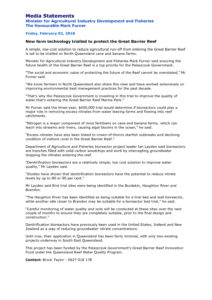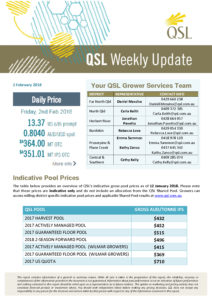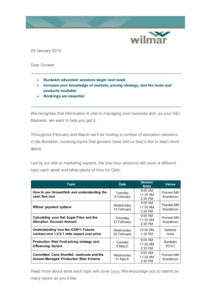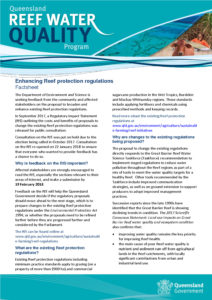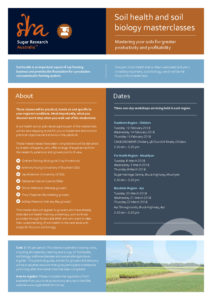Category: KCGO News
The latest news from Kalamia Cane Growers and Kalagro for Members Only.
QSL Weekly Update – 02/02/18
Wilmar Invitation – Build your marketing knowledge
CORES – Intervention Suicide Training
Queensland Reef Quality Program
“Queensland Reef Quality Program
Growers interested in providing feedback to the Dept of Environment and Science can do so directly as per factsheet or alternatively provide your comments to this office to enable a submission to be lodged on behalf of the collective. Comments are to be provided to this office by Wednesday 14th February.
Consultation Regulatory Impact Statement is considering two options to accelerate improved reef water quality:
- Option 1 – The current approach – no additional legislation
- Option 2 – Enhance and broaden reef protection legislation (Option preferred by government)
Summary Of Current Regulations In Relation To Sugarcane in the Burdekin:
- Growers required to comply with particular farming practices including fertiliser and chemical applications using prescribed methodologies.
- Calculating and applying the optimum amount of N and P.
- Mill mud nutrient deductions must be made from bag N and/or P fertiliser application rates.
Summary of Additional Regulations to that currently in place In Relation To Sugarcane (existing) in the Burdekin:
Stage 1
- Placement of fertiliser – no ground based broadcast fertiliser application.
- Calibration – Fertiliser equipment calibrated prior to the season, change of product and crop stage ie. plant and ratoon.
- Soil Loss Controls – Use of measures that will minimise the release of soil to receiving waters. At least one of the following practices are utilised:
- A green cane trash blanket,
- Laser levelling away from watercourses.
- Recycling pit or constructed wetlands designed to capture run-off.
Stage 2 (to be undertaken within two years of the regulation commencing)
- In addition to continuance of stage 1 adoption of a nutrient management plan in all reef catchments within two years of commencement of legislation
With Option 2 growers accredited against BMP or like programs will be deemed as complying with the minimum regulatory standards.”
Sugarcane Nitrogen rate mate tool launched
Sugarcane nitrogen rate mate tool launched
Canegrowers now have a new online tool at their disposal to help with calculating nitrogen costs.
The ‘Sugarcane Nitrogen Rate Mate’ has been developed by the Department of Agriculture and Fisheries (DAF) as a step-by-step guide to help growers to calculate nitrogen rates, cost savings and more.
DAF agricultural economist, Samuel Cook said growers could save money by monitoring their nitrogen use more closely and changing their method of calculating fertiliser rates.
“By using the tool, it will help growers analyse the impact of nitrogen use on farm profitability,” Mr Cook said.
“Growers undertake a simple and quick assessment of their nitrogen requirements, and the tool will estimate the cost savings a farmer can make by reducing their nitrogen rate.
“The step-by-step guide is easy to use and contains graphs showing current costs and potential savings.
“Until now, growers have had to calculate this for themselves by using a worksheet, which can be time consuming and difficult to analyse.”
Mr Cook said feedback was welcome from growers about the usability and functionality of this tool.
The Sugarcane Nitrogen Rate Mate is available from the Department of Agriculture and Fisheries website at http : http://bit.ly/NitrogenMate or call 13 25 23.
NQ Dry Tropics – Reef Tender
“Flyer was recently posted to our webpage for a workshop to be held by NQ Dry Tropics at PCYC Ayr on 5th February in relation to “Reef Trust Tender Round 3”.
This workshop will guide growers on how to submit a tender application. To register for this event please email [email protected] or contact via phone on 4799 5300.
For growers interested in the Round 3 of the Repeated Reef Trust Tenders additional information is now available via the following NQ Dry Tropics link http://www.nqdrytropics.com.au/reef-trust-repeated-tenders-burdekin/ which includes a number of detailed factsheets.”
Members Notice – SRA Masterclass Invite
Media Statement – Queensland Farm Debt Restructure Office opens
Media Statements
JOINT STATEMENT
Premier and Minister for Trade
The Honourable Annastacia Palaszczuk
Minister for Agricultural Industry Development and Fisheries
The Honourable Mark Furner
Tuesday, January 23, 2018
Queensland Farm Debt Restructure Office opens
The Palaszczuk Government has established a dedicated office to assist Queensland primary producers experiencing financial distress access free expert financial analysis and advice.
Premier Annastacia Palaszczuk said the Farm Debt Restructure Office was the Government’s latest initiative in the ongoing commitment to the agricultural sector and the issue of rural debt delivering a number of protections for Queensland farmers.
“The Office provides eligible primary producers with a no-fee, no-obligation assessment of their business and financial position, to help them make informed decisions on the future of their agricultural enterprise,” she said.
“The Office will be overseen by the Queensland Rural and Industry Development Authority and it will work with the Authority’s network of nine offices, including the office here in Roma.”
“My Government is working to grow our primary industries sector. It’s a vital contributor to our economy and the backbone for rural and regional Queensland. I welcome the recent AgTrends forecast for the total value of Queensland’s primary industry commodities for 2017-18 to be almost $20 billion -$19.87 billion.”
Agricultural Industry Development Minister Mark Furner said the assistance doesn’t replace a producer’s existing financial providers or advisors, but complements them by offering an alternate opinion.
“Farm Business Analysis Assistance offers eligible farmers with detailed, expert options from an approved rural finance professionals at a level that the producer may not be able to afford at their time of distress,” he said.
“The report which follows an on-farm visit will give realistic options and ideas on how to repair, reduce or rationalise farming activities within the available resources, for the best possible outcome for the farmer and their family.”
The initiatives were part of the Farm Business Debt Mediation Act 2017 passed by the Queensland Parliament last year and include the now mandatory Farm Business Debt Mediation introduced to prevent foreclosure on farm debt without a fair and equitable mediation process.
KCGO MEMBERS – Quad Bike Safety Information
Quad Bike Safety Information
“A very sobering story and highlights the need for the proper PPE and training not only for our children but also farm employees.”
New Safety Advocates join the campaign for quad bike safety
In 2018, Workplace Health and Safety Queensland welcomes two new Safety Advocates, Jodie and Mario Cocco, who are passionate about quad bike safety, especially where children are involved.
Their son Domenic was just seven years old when he suffered life-threatening injuries after crashing a quad bike into a power pole. We published a film about the incident in 2016, with Jodie and Mario describing the horrifying experience and the impact it had on their family. The next logical step for the Coccos was to start telling their story personally in workplaces as Safety Advocates.
“You think it’s not going to happen to you, but it can. Make sure your kids have got the right protective equipment on, make sure they’re wearing a helmet, and make sure they know how to operate the quad bike properly,” Jodie says.
In their role as Safety Advocates, Jodie and Mario will focus on quad bike safety with a special emphasis on children using these machines. They highlight how important it is to always wear a helmet when riding, as well as the benefits of formal training.
The film, Too fast, too soon – Domenic’s story, has been viewed over 4000 times and is a stark reminder of how quickly things can go wrong and the serious consequences that follow.
Since it began in 2013, our Safety Advocate program has gone from strength to strength. Last year our Safety Advocates between them spoke to Queensland workers and communities at more than 100 events. Feedback on their visits is incredibly positive – a clear indication that sharing their stories is having a profound impact on Queenslanders and prompting them to think about the importance of working safely.
Further information
For more information on the Coccos’story, go to worksafe.qld.gov.au/safety-advocates or request a Safety Advocate visit to your business.
